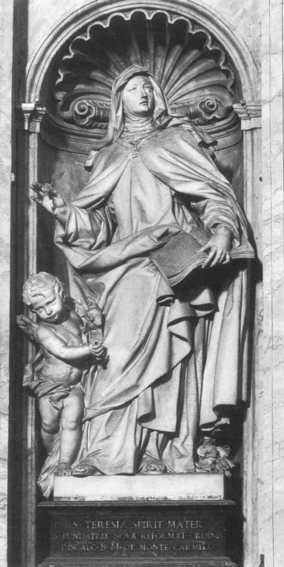This morning on my train ride into the City, I was reading a monograph by Archabbot Lambert Reilly, OSB, the emeritus archabbot of St Meinrad Archabbey, “Prayer: A Conversation with God.” I recommend it. Why? Because I need to be reminded that prayer is not a monologue but a dialogue; it is the heart speaking to the Heart. I also have to remember it is not about me exclusively but about Him who is greater than I.
Tag: St Teresa of Avila
Real change in history not administrative but of the heart, Discalced Carmelite superior says
Personal and corporate renewal is always a timely topic. Recently, the Superior General of the Discalced
Carmelites, Father Saverio Cannistrà, speaking about the hope of renewing his
order answered a question in what he saw as essential to renewal. I think the renewal is not only for the Carmelites but for all us. Don’t you think?
“it is rather like the way of prayer Saint Teresa [of Avila] talks about: a growth that
happens day by day, passing through moments of consolation and desolation, but
with the determination to forge ahead, without giving up. The real changes
which have had an effect on history, are not mere administrative reorganizations:
they are changes of heart, as Scripture tells us. If we do not expose our heart
to the beneficial tempest of the Spirit, then generous and prophetic
initiatives cannot be born from it. Formation, both initial and ongoing, would
probably be the sole help that we could offer, as an institution, to tread this
path.”
Saint Teresa of Jesus (Avila)
I was a bit more conscious of today’s feast being of the great Carmelite saint, founder and Doctor of the Church, Saint Teresa of of Jesus (Avila). She has a particular hold on me because of her honesty and her extraordinary attention to human experience. This is especially true when you heed what Teresa is saying about friendship and those distinctions between the human friendship that what is shared with the Lord. The Office of Readings provided for us by the Church –and herewith published with my emphasis– reminded me of something that’s been on my mind for some time: am I mindful of Jesus right now? The sacred Liturgy is most direct in reminding us that salvation is given to us today. We are not saved at some point in the future, but right now. Eternal life doesn’t only begin when we give up the ghost, but we live in the Eschaton at this moment of existence. Don’t be fooled: Christ uses our human experience to manifest the promise of our divine destiny. So I ask you, Are you mindful of Christ right now? If not, why? What is distracting you? If so, in what ways are you paying mind to Him?
Christ Jesus dwells in a man as his friend and noble leader, that man can
endure all things, for Christ helps and strengthens us and never abandons us.
He is a true friend. And I clearly see that if we expect to please him and
receive an abundance of his graces, God desires that these graces must come to
us from the hands of Christ, through his most sacred humanity, in which God
takes delight.
Lord has told it to me. I have definitely seen that we must enter by this gate
if we wish his Sovereign Majesty to reveal to us great and hidden mysteries. A
person should desire no other path, even if he is at the summit of
contemplation; on this road he walks safely. All blessings come to us through
our Lord. He will teach us, for in beholding his life we find that he is the
best example.
Unlike our friends in the world, he will never abandon us when we are troubled
or distressed. Blessed is the one who truly loves him and always keeps him
near. Let us consider the glorious Saint Paul: it seems that no other name fell
from his lips than that of Jesus, because the name of Jesus was fixed and
embedded in his heart. Once I had come to understand this truth, I carefully
considered the lives of some of the saints, the great contemplatives, and found
that they took no other path: Francis, Anthony of Padua, Bernard, Catherine of
Siena. A person must walk along this path in freedom, placing himself in God’s
hands. If God should desire to raise us to the position of one who is an
intimate and shares his secrets, we ought to accept this gladly.
think of Christ we should recall the love that led him to bestow on us so many
graces and favors, and also the great love God showed in giving us in Christ a
pledge of his love; for love calls for love in return. Let us strive to keep
this always before our eyes and to rouse ourselves to love him. For if at some
time the Lord should grant us the grace of impressing his love on our hearts,
all will become easy for us and we shall accomplish great things quickly and
without effort.
Saint Teresa of Jesus of the Andes
 On the liturgical ordo of the Carmelite Order today is the feast of the relatively unknown saint outside some circles (on the Roman ordo today’s saint is memorialized on April 12). Saint Teresa of Jesus of the Andes was born on July 13, 1900 and died on April 12, 1920 and having spent only 11 months as a Carmelite nun.
On the liturgical ordo of the Carmelite Order today is the feast of the relatively unknown saint outside some circles (on the Roman ordo today’s saint is memorialized on April 12). Saint Teresa of Jesus of the Andes was born on July 13, 1900 and died on April 12, 1920 and having spent only 11 months as a Carmelite nun.
Saint Teresa of Jesus (Avila)
Come, Spouse of Christ, receive the crown which the Lord has
prepared for you for all eternity.
Graciously hear us, O God our Savior, that
as we rejoice in the festival of blessed Teresa, Your Virgin, so may we be fed
by her heavenly teaching and be strengthened in the love of true piety.
This is image of Saint Teresa was done by Bernini and it brings together notable themes of his life and work. Namely, the meeting of heaven and earth; God bowing down to touch the heart of man and woman. Bernini’s influence on doing this sculpture was this passage from Saint Teresa’s autobiography:
“I saw
in his hand a long spear of gold, and at the iron’s point there seemed to be a
little fire. He appeared to me to be thrusting it at times into my heart, and
to pierce my very entrails; when he drew it out, he seemed to draw them out
also, and to leave me all on fire with a great love of God. The pain was so
great, that it made me moan; and yet so surpassing was the sweetness of this
excessive pain, that I could not wish to be rid of it. The soul is satisfied
now with nothing less than God. The pain is not bodily, but spiritual; though
the body has its share in it. It is a caressing of love so sweet which now
takes place between the soul and God, that I pray God of His goodness to make
him experience it who may think that I am lying.” (The Life of Teresa of Jesus, Chapter 29, part 13)
Recall that this saint’s life spanned from 1515-1582 and she was a contemporary with Saint John of the Cross, Saint Ignatius of Loyola and Saint Peter of Alcantara (who encouraged the Carmelite reform) was a spiritual father to her. She is also 1 of 3 women Doctors of the Church. If what you read here appetizing to read more of Saint Teresa’s life and work, I would recommend starting with the brief bio at New Advent, the Interior Castle and then or The Collected Works of St. Teresa of Avila.
Saint Teresa of Avila sets all our hearts on fire
Oh Beauty exceeding
 All other beauties!
All other beauties!
Paining, but You wound not
Free of pain You destroy
The love of creatures.
Oh, knot that binds
Two so different,
Why do You become unbound
For when held fast You strengthen
Making injuries seem good.
Bind the one without being
With being unending;
Finish, without finishing,
Love, without having to love,
Magnify our nothingness.
 The Interior Castle is the principal source of mature Teresian thought on the spiritual life in its integrity. Chief emphasis is laid on the life of prayer, but other elements (the apostolate, for example) are also treated. The interior castle is the soul, in the center of which dwells the Trinity. Growth in prayer enables the individual to enter into deeper intimacy with God–signified by a progressive journey through the apartments (or mansions) of the castle from the outermost to the luminous center. When a man has attained union with God in the degree permitted to him in this world, he is “at the center” of himself; in other words, he has integrity as a child of God and as a human being. Each of the apartments of the castle is distinguished by a different stage in the evolution of prayer, with its consequent effects upon every other phase of the life of the individual. (from an essay by a Carmelite nun, Austria)
The Interior Castle is the principal source of mature Teresian thought on the spiritual life in its integrity. Chief emphasis is laid on the life of prayer, but other elements (the apostolate, for example) are also treated. The interior castle is the soul, in the center of which dwells the Trinity. Growth in prayer enables the individual to enter into deeper intimacy with God–signified by a progressive journey through the apartments (or mansions) of the castle from the outermost to the luminous center. When a man has attained union with God in the degree permitted to him in this world, he is “at the center” of himself; in other words, he has integrity as a child of God and as a human being. Each of the apartments of the castle is distinguished by a different stage in the evolution of prayer, with its consequent effects upon every other phase of the life of the individual. (from an essay by a Carmelite nun, Austria)
Graciously hear us, O God, our Savior, that as we rejoice in the festival of blessed Teresa, Thy Virgin, so may we be fed by her heavenly teaching and be strengthened in the love of true piety.


